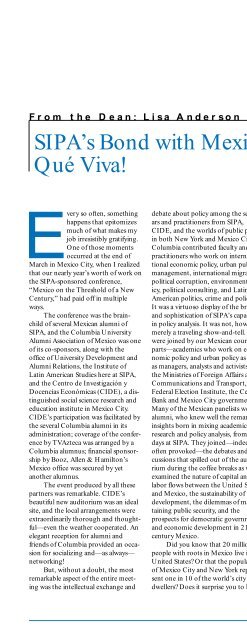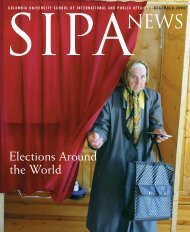SIPA NEWS - School of International and Public Affairs - Columbia ...
SIPA NEWS - School of International and Public Affairs - Columbia ...
SIPA NEWS - School of International and Public Affairs - Columbia ...
Create successful ePaper yourself
Turn your PDF publications into a flip-book with our unique Google optimized e-Paper software.
It was a virtuoso display <strong>of</strong><br />
the breadth <strong>and</strong> sophistication<br />
<strong>of</strong> <strong>SIPA</strong>’s capacities in<br />
policy analysis.<br />
From the Dean:<br />
Lisa Anderson<br />
<strong>SIPA</strong>’s Bond with Mexico:<br />
Qué Viva!<br />
Every so <strong>of</strong>ten, something<br />
happens that epitomizes<br />
much <strong>of</strong> what makes my<br />
job irresistibly gratifying.<br />
One <strong>of</strong> those moments<br />
occurred at the end <strong>of</strong><br />
March in Mexico City, when I realized<br />
that our nearly year’s worth <strong>of</strong> work on<br />
the <strong>SIPA</strong>-sponsored conference,<br />
“Mexico on the Threshold <strong>of</strong> a New<br />
Century,” had paid <strong>of</strong>f in multiple<br />
ways.<br />
The conference was the brainchild<br />
<strong>of</strong> several Mexican alumni <strong>of</strong><br />
<strong>SIPA</strong>, <strong>and</strong> the <strong>Columbia</strong> University<br />
Alumni Association <strong>of</strong> Mexico was one<br />
<strong>of</strong> its co-sponsors, along with the<br />
<strong>of</strong>fice <strong>of</strong> University Development <strong>and</strong><br />
Alumni Relations, the Institute <strong>of</strong><br />
Latin American Studies here at <strong>SIPA</strong>,<br />
<strong>and</strong> the Centro de Investigación y<br />
Docencias Económicas (CIDE), a distinguished<br />
social science research <strong>and</strong><br />
education institute in Mexico City.<br />
CIDE’s participation was facilitated by<br />
the several <strong>Columbia</strong> alumni in its<br />
administration; coverage <strong>of</strong> the conference<br />
by TVAzteca was arranged by a<br />
<strong>Columbia</strong> alumnus; financial sponsorship<br />
by Booz, Allen & Hamilton’s<br />
Mexico <strong>of</strong>fice was secured by yet<br />
another alumnus.<br />
The event produced by all these<br />
partners was remarkable. CIDE’s<br />
beautiful new auditorium was an ideal<br />
site, <strong>and</strong> the local arrangements were<br />
extraordinarily thorough <strong>and</strong> thoughtful—even<br />
the weather cooperated. An<br />
elegant reception for alumni <strong>and</strong><br />
friends <strong>of</strong> <strong>Columbia</strong> provided an occasion<br />
for socializing <strong>and</strong>—as always—<br />
networking!<br />
But, without a doubt, the most<br />
remarkable aspect <strong>of</strong> the entire meeting<br />
was the intellectual exchange <strong>and</strong><br />
debate about policy among the scholars<br />
<strong>and</strong> practitioners from <strong>SIPA</strong>,<br />
CIDE, <strong>and</strong> the worlds <strong>of</strong> public policy<br />
in both New York <strong>and</strong> Mexico City.<br />
<strong>Columbia</strong> contributed faculty <strong>and</strong><br />
practitioners who work on international<br />
economic policy, urban public<br />
management, international migration,<br />
political corruption, environment policy,<br />
political consulting, <strong>and</strong> Latin<br />
American politics, crime <strong>and</strong> policing.<br />
It was a virtuoso display <strong>of</strong> the breadth<br />
<strong>and</strong> sophistication <strong>of</strong> <strong>SIPA</strong>’s capacities<br />
in policy analysis. It was not, however,<br />
merely a traveling show-<strong>and</strong>-tell. We<br />
were joined by our Mexican counterparts—academics<br />
who work on economic<br />
policy <strong>and</strong> urban policy as well<br />
as managers, analysts <strong>and</strong> activists from<br />
the Ministries <strong>of</strong> Foreign <strong>Affairs</strong> <strong>and</strong><br />
Communications <strong>and</strong> Transport, the<br />
Federal Election Institute, the Central<br />
Bank <strong>and</strong> Mexico City government.<br />
Many <strong>of</strong> the Mexican panelists were<br />
alumni, who knew well the remarkable<br />
insights born in mixing academic<br />
research <strong>and</strong> policy analysis, from their<br />
days at <strong>SIPA</strong>. They joined—indeed,<br />
<strong>of</strong>ten provoked—the debates <strong>and</strong> discussions<br />
that spilled out <strong>of</strong> the auditorium<br />
during the c<strong>of</strong>fee breaks as we<br />
examined the nature <strong>of</strong> capital <strong>and</strong><br />
labor flows between the United States<br />
<strong>and</strong> Mexico, the sustainability <strong>of</strong> urban<br />
development, the dilemmas <strong>of</strong> maintaining<br />
public security, <strong>and</strong> the<br />
prospects for democratic government<br />
<strong>and</strong> economic development in 21st<br />
century Mexico.<br />
Did you know that 20 million<br />
people with roots in Mexico live in the<br />
United States? Or that the populations<br />
<strong>of</strong> Mexico City <strong>and</strong> New York represent<br />
one in 10 <strong>of</strong> the world’s city<br />
dwellers? Does it surprise you to learn<br />
that “globalization” <strong>and</strong> “informal<br />
economy” aren’t any easier to define in<br />
Spanish than in English? Or that the<br />
March presidential elections in Taiwan<br />
were closely followed in Mexico, as<br />
they consider the possibility that the<br />
longtime ruling party might lose the<br />
presidency in elections scheduled for<br />
July?<br />
We did not resolve all <strong>of</strong> the<br />
dilemmas which face Mexico at the<br />
beginning <strong>of</strong> the 21st century, but I<br />
suspect that our conference did contribute<br />
a few good ideas to the ongoing<br />
discussions. Equally importantly,<br />
we cemented our ties with a vibrant<br />
<strong>and</strong> growing alumni community in<br />
Mexico, a group that makes up a nontrivial<br />
element in the country’s policy<br />
elite.<br />
It is my hope that we will continue<br />
to be a resource for all our<br />
alumni long after they leave Morningside<br />
Heights: a source <strong>of</strong> research <strong>and</strong><br />
ideas, <strong>of</strong> moral support <strong>and</strong> even <strong>of</strong><br />
conviviality <strong>and</strong> friendship. This conference<br />
demonstrated the enormous<br />
gratifications in that role, <strong>and</strong> it is a<br />
model I hope we will be able to export<br />
well beyond Mexico. All we will need<br />
are alumni as talented <strong>and</strong> dedicated as<br />
Hector de la Cruz, Alej<strong>and</strong>ro<br />
Echegaray, Raphael Freyre, Feliciano<br />
Garciarramos, Beatriz Leycegui, Francisco<br />
Meré, Federico Rublí, Luis Carlos<br />
Ugalde, <strong>and</strong> Abraham Zamora—<br />
<strong>and</strong> above all, Gustavo Cano, who<br />
served as the tireless <strong>and</strong> ever-smiling<br />
conference coordinator. I am proud to<br />
be associated with them <strong>and</strong> with their<br />
school.<br />
S I P A n e w s<br />
1

















